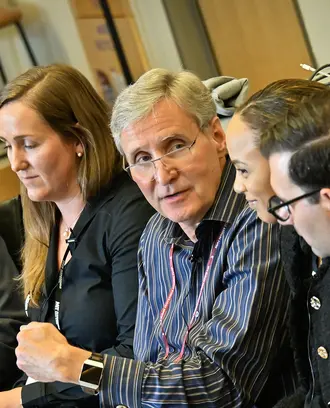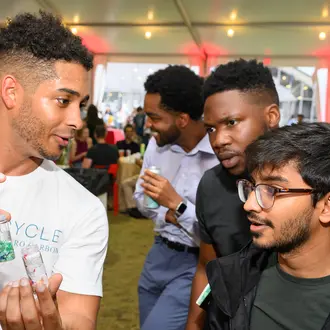With employers filling 60 percent fewer management positions and otherwise guaranteed internship opportunities succumbing to budget cuts amid the COVID-19 pandemic, students at MIT Sloan were scrambling ahead of the summer of 2020.
“I was already applying to different opportunities at the end of February and the beginning of March, and then the pandemic happened,” says Edward Poghosyan, MFin ’21. “As you can imagine, most of the jobs were just gone. I was going to the same websites, but the opportunities they had listed were no longer available.”
The school immediately began working to find solutions for Poghosyan and others. Dean David Schmittlein invited alumni to help with job and internship placements by posting open positions with the Career Development Office and offering to volunteer or coach those seeking guidance for specific industries. He also reached out to entrepreneurial initiatives and centers on campus.
“We received an email from the dean’s office,” says Edward Golding, executive director of the MIT Golub Center for Finance and Policy. “The center usually hosts a few interns every summer, but they wanted to know if we could do more—so we did.”
In consultation with the dean’s office and career development, Golding and Deborah Lucas, director of the Golub Center and Sloan Distinguished Professor of Finance, got to work. They created six summer internships for students in the MBA and Master of Finance programs and distributed the news widely through many channels. Like the email newsletter that Sally Wang, MFin ’21, received in late April.
“I wasn’t sure who I should talk to. I just knew that, in order to get into the finance industry, I needed to have previous experience,” she says.
After reading about the Golub Center’s new opportunities, Wang jumped at the chance to apply. She earned one of the six spots, working on a project analyzing the economics of mortgage credit transfer bonds. The internship would provide her with immediate relief from the pandemic-induced downturn, but it also offered something far more significant—relevant experience that would fill any gaps in her record and better prepare for recruiting.
Others caught wind of the internships in a more direct manner. While discussing summer options during a one-on-one meeting, Heidi Pickett, assistant dean of the Master of Finance program, asked Poghosyan for his thoughts on doing research with the Golub Center.
“That was basically the first time I had heard of the opportunity,” he says. “Ed Golding shot me an email asking if we could meet, so we did. It happened two days before I returned to Armenia, and now I can’t go back to the U.S. because of the pandemic, but I got the offer.”
As the Golub Center continued to fill the remaining positions, MIT Sloan transitioned to an online format for the rest of the spring term and all of the summer session. This meant everyone had to figure out how to make their summer internships work across vast distances and disparate time zones. So, when Poghosyan began compiling a report on the health of local government pension plans for his project with Lucas in late May, he did so while eight hours ahead of Cambridge.
“It’s a different experience when you’re talking to someone via Zoom. You’re not in a typical office setting where, if you’re having trouble overcoming a hard problem, you can hop over to the next desk to discuss it with a colleague,” Poghosyan explains.
“But Ed and the rest of the team are very supportive. I can email them at any time and ask for help if I’m having trouble. We also have team meetings once a week, where we come together to discuss our projects, any issues we might be having, and ways we can help each other. It makes us feel like we’re really part of a community—even though it’s all online.”
Maintaining this sense of comradery and collaboration, despite the limits of its virtual makeup, was integral to what the Golub Center had in mind for the internships. Lucas and Golding’s efforts paid off, for even when they were attending video conferences or compiling data from homes as close as Boston or as distant as Lebanon, the students employed by the Golub Center still felt like they were a part of something remarkable.
Even while analyzing Federal Housing Finance Agency mortgage capital standards from his apartment in Beirut, Georges Geha, MFin ’21, knew he could rely on the group for support.
“I think this makes all the difference between MIT Sloan and other institutions,” he says. “It’s such a supportive and caring community, and in my opinion, you cannot find that anywhere else in the world. That’s what makes MIT so unique and special.”
Alumni interested in helping MIT Sloan students with job and internship placements can post open positions with the Career Development Office, or offer coaching to those seeking guidance for specific industries. To reach out to the Golub Center, send an email to gcfp@mit.edu.



